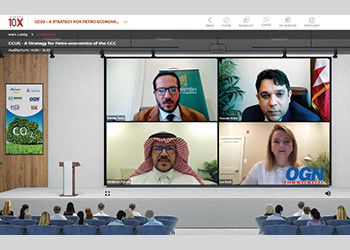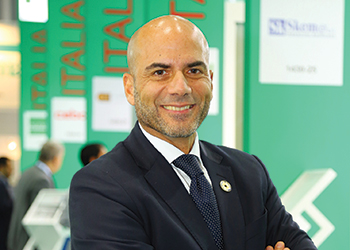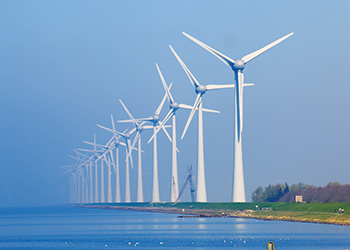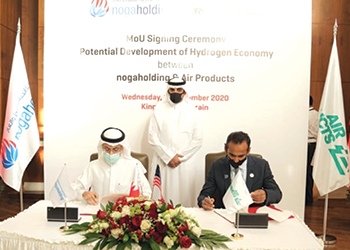
 Scarpa ... Italian investment in renewables is growing
Scarpa ... Italian investment in renewables is growing
Italian components for desalination and solar power plants to the UAE have steadily increased over the last few years, with a 16.47 per cent increase in the first trimester of 2020, Amedeo Scarpa, Italian Trade Commissioner to the UAE, Oman and Pakistan, tells OGN
The renewable energy market is on an upward trajectory. In less than five years, the International Renewable Energy Agency (Irena) predicts the global renewable energy market to reach $2,152.9 billion, an increase of 4.9 per cent compared to 2017.
The Renewable Energy Market Outlook 2025 published earlier this year points to three driving factors to this growth: the steady increase in government funding in the sector, the gradual freeing from fossil fuel exploitation, and - significantly for Italy - the continued technological advances, Amedeo Scarpa, Italian Trade Commissioner to the UAE, Oman and Pakistan, tells Abdulaziz Khattak for OGN.
"Due to its natural characteristics, Italy has a territory with high solar radiation and high levels of wind production. It boasts all the best characteristics in order to accommodate a wide range of production settlements from renewable sources. This has spurred a growth in renewable energy production, technology and R&D in recent years in Italy, making it one to watch in the global marketplace."
ITALY’S ADVANCEMENTS
Stepping away from the global figures for a moment; the trend of greenhouse gas emissions over the last 28 years in Italy is positive. In 2018, emissions were down by 17 per cent compared to 1990 and -0.9 per cent when compared to 2017. The decrease is due to the growth of renewable energy production (hydroelectric and wind) and the increase in energy efficiency in industrial sectors.
Three years ago, Italy launched the National Sustainable Development Strategy, which is helping to shape a new vision towards a circular, low-emission economy, resilient to climate impacts and to other global changes. Alongside this, our National Integrated Energy and Climate Plan had set its own target – by 2030, 30 per cent of Italy’s energy consumption must come from renewable resources.
In 2019, Italy exceeded the 17 per cent threshold of energy consumption met by renewable sources for the sixth year in a row; a goal set by the "Green Deal" produced by the European Union in the first trimester of 2020.
GROWTH OF TECHNOLOGY & INVESTMENT
As we are seeing, sustainable and renewable technology is a growing sector in Italy. Last year, €2.6 billion investments in the green sector in Italy have been activated and €14.8 billion will be invested in sustainability.
Due to the major changes in both environmental and energy policies, Italian businesses are gaining momentum. Since 2007, several European financial groups have invested in the Italian renewable energy sector contributing to the national GDP for €48.5 million.
The Italian renewable sector has received investment from other countries, mainly other member states of the EU, including Portugal and Germany. Outside of Europe there is growing investment from non-European counties. Since 2012, Canada and China have been revealed to be the biggest investors for the Italian green power.
As well as receiving investment, there are a huge number of companies and investment groups which have settled in Italy. The appetite for the Italian renewable energy sources and plants is high and the number of foreign-participated companies has been increasing across the last decade. In parallel with European investors, Italy’s advancements have also attracted funds from overseas, and two main sponsors have been Japan and the UAE. Groups from these two countries have decided to relocate part of their productive process in Italy generating a global amount of €91.9 million in revenues and 415 jobs opportunities.
IMPACT OF COVID-19
Discussing the growth of the renewable energy sector has to take into account the global pandemic. As one of the hardest-hit countries in Europe, it has impacted the country’s energy sector.
According to a report published by analysts of the Italian business consultancy Althesys, the slowdown in production activities, following the lockdown measures implemented due to the Covid-19 emergency, has sharply cut electricity consumption all over the country. Since mid-March 2020, national electricity demand has fallen by more than 20 percent.
However, Italians are consuming less but consuming "greener". As demand declines, renewable energy is in fact, growing. Thanks to the dispatch priority, clean energy was able to meet 42 per cent of the national needs, compared with a gross installed power of about 54 GW. This is an increase of 2 per cent compared to the pre-coronavirus period.
In addition, investment is resilient in the sector and it is currently not at risk. These investments are operating with a long-term vision, well beyond the presumed effect of Covid-19. It is the fossil sector and the reactivation of thermal power plants which are the energy sectors that are more at risk.
ITALY-UAE COLLABORATION
In October, the UAE hosted the Water, Energy, Technology, and Environment Exhibition (WETEX) and it was the first ever carbon neutral 3D virtual exhibition of its kind. As long-term supporters of the exhibition, the Italian Trade Agency (ITA) was participating for the 14th year, presenting 31 Italian companies, almost one-third of all foreign companies partaking. In line with the growth of the sustainable and renewable technology sector in Italy, it was also nearly a 50 per cent increase in the number of Italian companies that attended the exhibition in 2019.
The selected companies are covering a cross-section of the country’s offerings, including water treatment, recycling, solar energy generation and renewables, air control and environmental protection systems, and green building systems. These advancements have contributed to Italy’s recent energy savings’ great performance with a reduction of 43 million tons carbon emissions last year: one of the best EU and world performances.
Although this year has undoubtedly raised challenges due to Covid-19, it’s still a very growing market. The UAE’s renewable sector has not been dramatically affected by the pandemic, and has a target to get 50 per cent of its energy needs from clean sources by 2050. The extent of supply of Italian components used for desalination and solar power plants to the UAE has steadily increased over the last few years. Since 2017, Italy has consistently been one of the UAE’s preferred suppliers for renewable energy sector components, with a 16.47 per cent increase in the first trimester of 2020.












































































